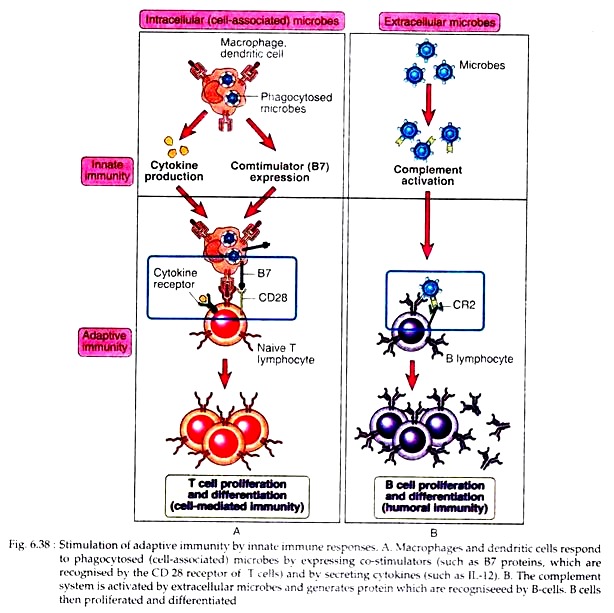Innate and adaptive immunity do not operate independent of each other. They act in cooperative and interdependent ways that make both of them more effective. The activation of innate immune responses provides signals that function in concert with antigen to stimulate the proliferation and differentiation of antigen-specific T and B lymphocytes (Fig. 6.38).
In addition, the adaptive immune system generates signals and components that stimulate and increase the effectiveness of innate immune responses.
According to the two-signal hypothesis for lymphocyte activation, signal 1 is always the antigen, and signal 2 is either a product of a microbe or a component of the innate immune response (cytokines, complement products etc.) that identifies the antigen as a microbial product. Thus, innate immunity serves as the initial warning signal for the adaptive immune system to mount a protective host response.
ADVERTISEMENTS:
The second signals generated during innate immune response to different microbes not only enhance the magnitude of the subsequent adaptive immune response but also influence the nature of the adaptive response.
In case of infections caused by intracellular microbes, the macrophages phagocytose or recognise the microbes and respond by expressing co-stimulators. Macrophages also produce cytokines that stimulate T cell-mediated immunity.
Similarly, when T cells encounter specific antigen, some T cells secrete some cytokines that increase the ability of macrophages to kill the microbes they have ingested. On the other hand, many extracellular microbes that enter the blood activate circulating complement proteins, which, in turn, enhance the production of antibodies by B cells.
This humoral immune response serves to eliminate extracellular microbes. Thus, the cooperation between innate immunity and adaptive immunity is bidirectional, with each relying on components of the other to optimize host defence against infections.
